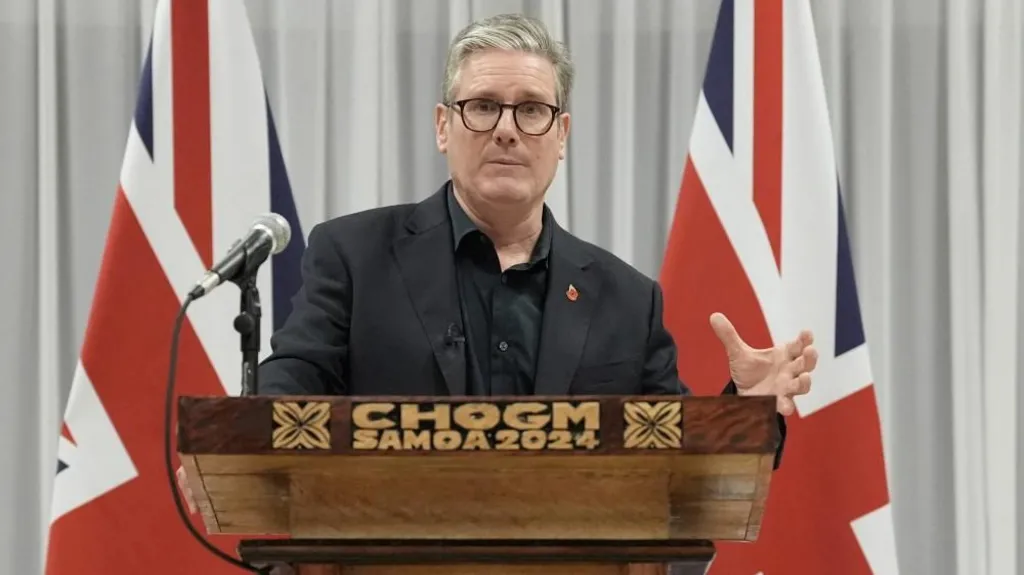
Commonwealth leaders have reached a consensus that the moment has arrived for an open dialogue regarding reparations linked to the slave trade, despite the UK’s efforts to avoid the topic during a recent two-day summit in Samoa. A joint statement, signed by 56 heads of government, including UK Prime Minister Sir Keir Starmer, acknowledges the increasing calls for discussions on “reparatory justice” concerning the “abhorrent” transatlantic slave trade.
The statement emphasizes the need for a “meaningful, truthful, and respectful conversation” about the historical injustices tied to slavery. Sir Keir Starmer clarified that the discussions at the summit did not include financial reparations, maintaining that the UK’s stance on the issue remains firm: no reparations will be paid. This position comes amid mounting pressure from Commonwealth nations urging the UK to both apologize and compensate for its historical involvement in the slave trade.
Reparations could encompass various forms, including financial compensation, symbolic gestures, educational initiatives, or public health support, aimed at benefiting those affected by slavery. Prior to the summit, Downing Street had asserted that reparations would not be discussed, leading to mixed reactions from leaders advocating for justice.
At a press conference following the summit, Sir Keir portrayed the meetings as productive and noted that discussions surrounding reparations were not the main focus. “The dominant theme of the two days has been resilience and climate,” he remarked, emphasizing that the reparations segment amounted to just a brief mention within a longer document. “None of the discussions have been about money. Our position is very, very clear in relation to that,” he added.
In a statement made last week, Chancellor Rachel Reeves reiterated that the UK would not be providing reparations for slavery, underscoring the government’s steadfast stance. Before the joint statement was issued, the Commonwealth leaders engaged in a lengthy six-hour conclave. Despite the extended discussions, Sir Keir indicated that reparations were not the reason for the duration of the meeting.
According to a Downing Street source, the government remains resolute: “We’ve been clear on our position and it’s not changing.” This unwavering approach has frustrated some nations advocating for reparations, who feel that a more open dialogue is warranted.
The delicate nature of diplomacy often involves fostering ongoing conversations about sensitive issues, even when immediate resolutions seem unlikely. For advocates of reparations, the joint statement provides a platform to continue pressing for discussions. Conversely, the UK government can assert that its position remains unchanged while simultaneously highlighting other pressing issues, such as trade, climate change, and security, which are also vital within the Commonwealth context.
Sir Keir did, however, hint at the potential for future discussions regarding reparatory justice, suggesting that the next opportunity to explore this topic might arise at the UK-Caribbean forum scheduled for March in London. Frederick Mitchell, the foreign minister of the Bahamas, expressed optimism about producing a “comprehensive report” on reparations during that forum, suggesting that he believes the UK will ultimately agree to financial reparations for Caribbean nations.
When questioned about the statement’s vagueness, Mitchell responded, “Behind the language is an attempt to go in a particular direction.” Diplomatic sources indicate that reparatory justice is likely to be a prominent topic in the agenda for the next Commonwealth summit, set to occur in two years.
Last year, a UN judge estimated that the UK may owe over £18 trillion in reparations related to its role in slavery across 14 Caribbean nations. This highlights the complexity and scale of the reparations debate, which could take multiple forms, including formal apologies or educational initiatives.
One notable supporter of reparations is Shirley Ayorkor Botchwey, Ghana’s foreign minister, who was recently appointed as the incoming Commonwealth secretary-general. She acknowledged the significance of the discussions ahead, stating she feels “truly humbled” by her new role and emphasized that “work indeed lies ahead” in addressing the historical injustices tied to the Commonwealth’s past.
As the dialogue on reparations unfolds, it appears that the Commonwealth may be at a pivotal moment in addressing its historical legacies, fostering a path toward reparative justice and healing.







